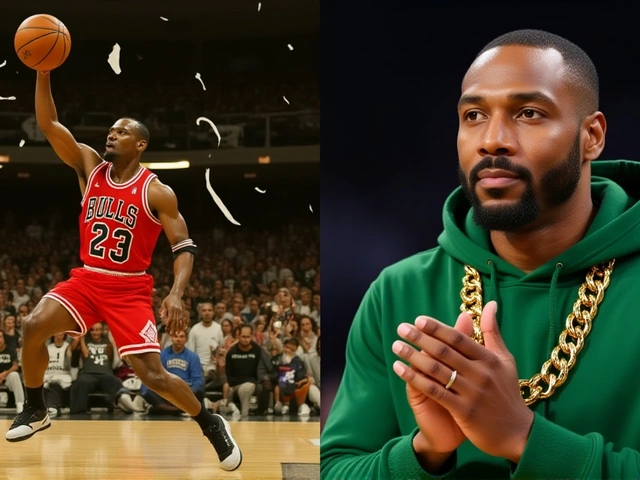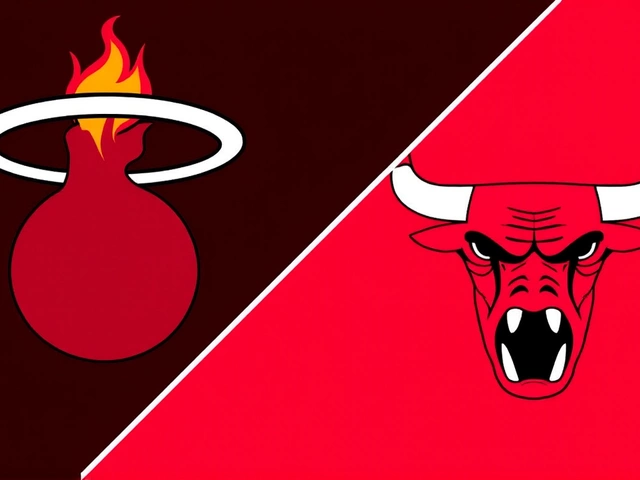When Paul Anthony Pierce watched Michael Jeffrey Jordan drain the game-winning jumper over Bryon Russell in the final seconds of Game 6, he was just a kid with a dream. That moment — June 14, 1998, at the United Center — wasn’t just basketball. It was the end of an era. And now, nearly 27 years later, Pierce, the Boston Celtics legend who was drafted the very next month, calls it the greatest single game ever played. "That was his last one in a Bulls uniform," Pierce said in a recent interview. "You don’t get moments like that anymore. Not like that. Not with that kind of weight."
The Perfect Ending — Until It Wasn’t
Jordan’s 45-point masterpiece in Game 6 of the 1998 NBA Finals wasn’t just about scoring. It was about control. He shot 14-of-27 from the field, 3-of-6 from deep, and a flawless 14-of-15 from the line. Three steals. One block. One rebound. And then, with 5.2 seconds left and the Bulls down 86-85, he crossed over Russell, stepped back, and buried the shot that sealed the Bulls’ sixth title — and his second three-peat. The final buzzer sounded on a team that had dominated the decade. The Chicago Bulls had won it all in 1991, 1992, 1993, 1996, 1997, and now 1998. No other franchise in NBA history has ever done that. And Jordan? He walked away. Or so everyone thought. Turns out, the story didn’t end cleanly. When Jordan returned to the Washington Wizards in 2001, it complicated the narrative. "It screwed up the perfect ending," Bob Costas, the legendary sportscaster, reportedly told colleagues. And Pierce gets it. He’s seen how the game treats legends — how the public wants clean arcs, tidy endings. Jordan’s farewell wasn’t just a game. It was a symphony. And then, suddenly, the encore.Pierce: The Witness Who Became the Heir
Pierce was 20 years old when Jordan played his final game in Chicago. He’d just been picked 10th overall by the Boston Celtics at the 1998 NBA Draft in Vancouver. He watched Game 6 on a tiny TV in his dorm room. He didn’t know it yet, but he’d spend the next 15 years trying to live up to what he’d just seen. "I modeled my game after him," Pierce said. "Not just the moves. The mentality. The way he carried himself when it mattered." He didn’t win a title until 2008 — when he, Kevin Maurice Garnett, and Walter Ray Allen Jr. crushed the Los Angeles Lakers in Game 6 of the Finals at TD Banknorth Garden. That night, Pierce scored 21 points in a 39-point win. He cried on the podium. He didn’t cry because he won. He cried because he finally understood what Jordan felt that night in ’98.The Weight of Legacy
Pierce reached 20,000 career points in 2012 — becoming the 17th player in NBA history to do so. He did it in a Celtics jersey, wearing the same number Jordan wore in Chicago. He stayed loyal when he could’ve left. When he asked for a trade in 2007, fearing he didn’t have time to wait for young players like Rajon Rondo and Al Jefferson to grow, the front office didn’t trade him. They built around him. And he repaid them with 15 seasons in Boston — more than any Celtic since Havlicek. Experts rank him anywhere from 45th to 75th all-time. Some say he’s the greatest small forward of the 2000s — above Ray Allen, Vince Carter, Tracy McGrady. Others say he’d be top 40 if he’d won another ring or a Finals MVP. But Pierce doesn’t care about rankings. He cares about meaning. "Jordan didn’t just win," Pierce says. "He made you believe you could win, too. Even if you were watching from a dorm room."What’s Left to Say?
The 1998 Finals weren’t the most dominant. The Bulls didn’t sweep. They barely won Game 6. But that’s the point. It was messy. Human. Real. Jordan had a bad night in Game 4. He missed free throws in Game 5. He was 35. His body was breaking down. And still — he found a way. That’s why it endures. Today, young players watch highlight reels of Jordan’s fadeaway like it’s mythology. But for Pierce, it was real. He saw it live. He felt it. He became it. And now, when he talks about Game 6, it’s not nostalgia. It’s reverence.Frequently Asked Questions
Why does Paul Pierce consider Game 6 of the 1998 Finals the greatest ever?
Pierce sees it as the perfect narrative closure: Jordan’s final game in a Bulls uniform, delivering a 45-point masterpiece to clinch a sixth championship, cementing his legacy before retirement. The emotional weight of that moment — combined with Jordan’s subsequent return to the Wizards — makes it uniquely poignant. For Pierce, who entered the league the same year, it was the benchmark he spent his career chasing.
How did Michael Jordan’s performance in Game 6 compare to his other Finals games?
Jordan’s 45-point Game 6 in 1998 was his highest-scoring Finals game since 1993. He shot 51.9% from the field, was perfect from the free-throw line (14-of-15), and added 3 steals and a block. While his 1993 Game 6 (41 points) and 1992 Game 1 (33 points) were iconic, none carried the same finality. This was his last stand with the Bulls — and he delivered like never before.
What impact did Jordan’s 1998 exit have on the NBA?
Jordan’s retirement left a void no player has fully filled. The league entered a transitional period marked by declining ratings and a lack of dominant personalities. The 2000s saw stars like Kobe Bryant and Allen Iverson rise, but none carried the same cultural weight. Even today, Jordan’s 1998 exit remains the gold standard for legacy management — something teams still try to replicate.
Why does Bob Costas believe Jordan’s Wizards stint "screwed up" the narrative?
Costas felt Jordan’s return to the Wizards in 2001 tarnished the myth of his perfect farewell. The 1998 Finals were meant to be the final act — a legendary swan song. Instead, Jordan returned as a 38-year-old player averaging 22 points on 40% shooting, which many saw as a distraction from his legacy. The narrative shifted from hero’s ending to complicated epilogue.
How does Paul Pierce’s 2008 championship compare to Jordan’s 1998 win?
Pierce’s 2008 title was a team effort — the "Big Three" of Garnett, Allen, and himself dominated the Lakers. But he says it felt different. Jordan’s win was solitary brilliance under pressure; Pierce’s was collective triumph. Still, Pierce admits the emotional release was identical: the weight of years, the validation of sacrifice. For both, it was the culmination of everything they’d worked for.
Where does Paul Pierce rank among NBA legends?
Most analysts place Pierce between 45th and 75th all-time, but he’s widely regarded as the greatest Celtics wing since Larry Bird and the top small forward of the 2000s. He ranks above Ray Allen, Vince Carter, and Tracy McGrady. His 20,000+ points, 15-year tenure with Boston, and clutch reputation give him enduring respect — even if he never won Finals MVP.

